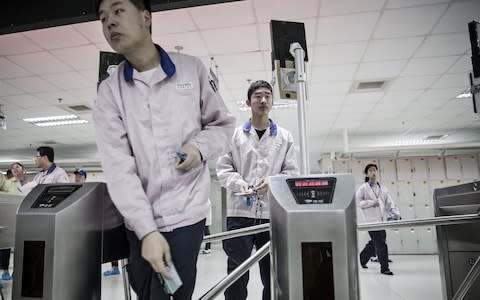Chinese professor files country's first lawsuit against use of facial recognition technology in zoo row
A Chinese professor has filed the country's first lawsuit against the use of facial-recognition technology after a Chinese zoo installed a new surveillance system for its ticket gate.
Guo Bing, a law professor at Zhejiang Sci-Tech University, has brought a rare lawsuit against the Hangzhou Safari Park, after it installed a facial recognition system in July to identify members for entry at its front gates, replacing an older fingerprint identification system, according to a state media report.
Those refusing to register their faces in the new entrance system are now barred, even if they’re among the thousands who have already ponied up the 1,360 yuan (£150) annual fee.
Facial recognition is commonplace in China, which aims to be the world leader in the technology.
Mr Guo has accused the park of violating Chinese consumer rights law by collecting personal data without obtaining consent, in a lawsuit accepted by a local court last Friday.

He initially demanded a full refund of his annual membership fee, but claims the park refused to return the full amount. “The reason I filed this lawsuit is not for compensation of economic loss,” Mr Guo told local media.
“I personally think the current application of facial-recognition technology still faces uncertainty and security risks, and needs to be regulated.”
How the court decides on the case could lead to more regulation and debate in China over the use of such surveillance technology by private businesses and the government.
Facial recognition technology is being deployed all over China, with everyone’s faces scanned and recorded.
It’s mandatory to submit to face-scanning in order to pass airport immigration, and some subway stations in Beijing allow entry to passengers via facial recognition.

Cash machines now offer facial recognition as an option to identify customers, universities have begun installing the technology at entrance gates for greater security, classrooms in some schools have facial recognition-equipped cameras to ensure pupils are paying attention, and digital payments can be approved via a face scan.
It is even possible to board a plane via facial recognition in some Chinese airports.
While some Chinese people have accepted this digital dragnet as a part of modern life, not everyone is convinced.
“Why can a zoo collect people's facial information? Who is responsible if there were a leak?” complained one user online.
“Are human viewing animals or the other way around?”
The technology is far from infallible – last month, a couple of primary school students hacked a facial recognition system by using a photograph to open a locker that held delivery packages.

 Yahoo News
Yahoo News 